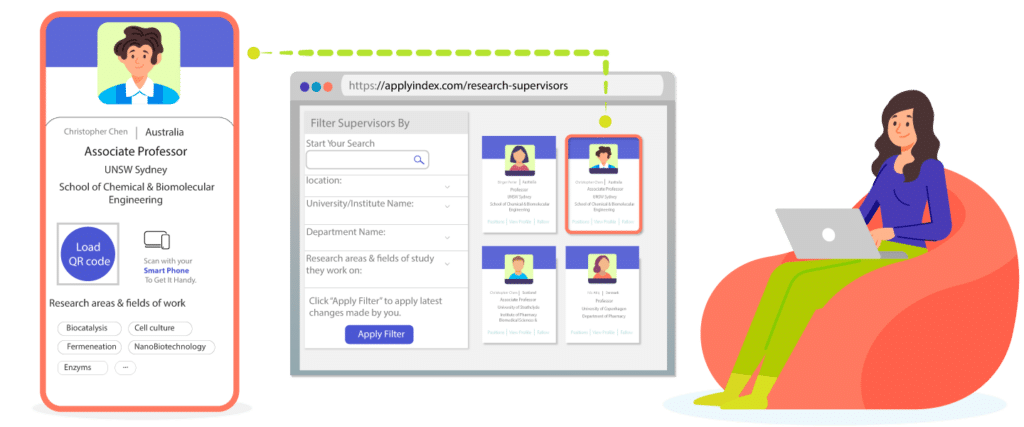If you are looking to find a PhD in your home country or overseas, congratulations, you have taken the first step toward a rewarding journey of personal and professional growth. A PhD develops critical thinking, research expertise, and problem-solving skills while opening doors to advanced career opportunities worldwide. By finding the right PhD, you can contribute to groundbreaking research, expand your academic network, and position yourself as an expert in your field of study or area of research. This guide will instruct you on how to find PhD positions that match your research interests and academic career goals. From choosing the suitable country for your PhD to learning how to secure PhD funding, we cover every essential step.
What Factors Influence Your Decision to Find a PhD?
You should familiarize yourself with the factors that may influence your decision on how to pursue a PhD. Many PhD students are motivated by intellectual curiosity, which often leads to both personal and professional fulfillment. Various personal (non-academic) and professional (academic and career-related) factors influence your decision when choosing where to pursue a PhD, which research field to specialize in, which professor to work with, and which program structure to follow. Professional preferences, in particular, will affect the universities and research groups you target. Additionally, there may be some factors out of your control that you have to take into consideration. Let’s explore some key parameters that shape your journey to find a PhD.
Personal Preferences in Finding PhD Positions
A Country’s Weather and PhD Timeline
Personal preferences strongly influence choosing a destination when you want to pursue a PhD. For example, if you dislike cold climates and are sensitive to them, you may want to exclude countries such as Canada, Norway, Finland, Denmark, or Sweden. On the other hand, if you are drawn to historically rich and culturally vibrant environments, Europe might be a better fit, especially countries such as France, Italy, Spain, or Germany. Another important factor is the position length. If you prefer a shorter PhD timeline of 3 to 3.5 years to enter the job market sooner, you may choose Australia, Belgium, the Netherlands, or Germany instead of the USA, Canada, or France, where PhD positions are usually longer.
Your Research Interests and Your Passion
A PhD requires long-term commitment and resilience, so aligning your position with your passions is essential. Your research interest may stem from a personal experience, such as losing a loved one to lung cancer, which inspires you to study biology and focus on cancer and medical research. Or it may arise from an emerging field you recently discovered, such as blockchain technology, which led you to transition from industrial engineering (your bachelor’s degree) to computer science for your graduate studies. Whatever the origin, passion for your chosen field will help sustain your motivation throughout your PhD.
Independence, Budget, and Funding
Other important contributing personal factors to consider are independence and budget. If you prefer a fully independent PhD research experience and do not require financial support, you may choose to self-fund your studies. However, if you rely on funding from governments, universities, supervisors, or private organizations, you will need to find PhD positions funded (partially or fully), which inevitably come with some compromises in independence. If funding is your primary concern, you should consider countries with a large number of PhD-granting universities, such as the USA, the UK, Germany, Japan, or China, as they typically offer more opportunities for financial support.
Professional Preferences in Finding PhD Positions
Career Goals and Job Market
Since a PhD opens pathways to academia, industry, and specialized roles, it is important to evaluate how your doctoral studies align with your career goals. If you are passionate about technology and want to be close to innovation hubs, pursuing a PhD in California’s universities can provide valuable networking opportunities with Silicon Valley companies. Similarly, if your background is in mechanical or automotive engineering and you are passionate about cars, Germany could be an ideal choice. A PhD there may allow you to collaborate with leading companies such as Mercedes-Benz, BMW, and Porsche. This is where university rankings become crucial, as the top-ranked universities offer better networking and career-related opportunities.

Working Under Supervision of Particular Professors
Some students are highly research-driven, with strong academic records (e.g., high GPAs, English proficiency test scores, publications, and any other CV credentials) that give them access to top institutions worldwide. If you fall into this category, you may prioritize working with specific professors who are internationally recognized leaders in your field. For example, if you are passionate about controlled radical polymerization and its applications in biomedical systems, you may aim to join the research group of Professor Krzysztof Matyjaszewski in the USA. Collaborating with such experts not only advances your research skills but can also pave the way for an academic career as a future professor.
Factors Beyond Your Control
Certain factors in this journey may be outside your control, particularly visa restrictions. For example, students from countries affected by the US travel ban (e.g., Iran, Libya, North Korea, Somalia, Syria, and Yemen) should know that visa processes can be a significant obstacle. If you hold a passport from one of these countries, it is important to carefully consider the risks before investing time, money, and effort into applications where visa approval is uncertain. Although restrictions may be formally announced by one country, other destinations like Germany, France, or Australia may adopt similar policies. If your dream is to study in a country with restricted visa prospects, always have a plan B in case your visa application is rejected.

How to Find a PhD: Key Steps to Success
Learning how to find a PhD requires strategic planning and thorough research. For example, if you have a strong CV and aim to work under specific supervisors, your options may be limited. If those professors lack research funding, you cannot secure a position with them. Even if funding exists, competition is intense since many candidates will also apply for their positions. In such cases, flexibility is essential. While every student’s journey is unique, the following general strategy outlines the key steps to successfully find a PhD:
Step 1: Prepare a Shortlist of Target Countries
By applying your personal preferences and considering the factors that are beyond your control, you should make a list of countries you want to focus on to find a PhD in. Whether it is the weather, culture, diversity, spoken language, nature, history behind a country and its people, or the job market of your field, choose between 2 to 4 countries for your list. Again, be careful not to gamble anything in the student visa process. Always have a backup plan, or even a Plan C. Never intend for only one country if you are an international student from a country subject to visa constraints.
Step 2: Define Research Interests and Prepare a CV
After narrowing down the list of countries, it is time to take further action by narrowing down your research interests and wrapping up an academic CV. Identify the field or specific topics you are passionate about or have a research background in. The research interests section of your resume is one of the most important sections because it not only helps you find a supervisor that aligns with your academic goals and the right PhD position, but also helps universities and professors to see if you are a good fit for their research infrastructure. For example, if you are interested in cancer treatment, you seek departments or schools with strong research facilities and enough number of professors in biomedical systems.
A clear focus on your research interests simplifies your PhD position search. If you are targeting PhD programs, in most cases, they don’t have to be the same as your previous research activities. On the other hand, if you apply for individual PhDs with a predefined title and topic, normally, those with the same research background are given priority to get the position. Review academic journals and read publications to understand current trends in your field. This step in how to find a PhD ensures you choose a program that supports your ambitions. Take time to explore interdisciplinary options if your interests span multiple areas.
Step 3: Gather Required Documents
To apply successfully and find a PhD abroad, you need to prepare essential documents. These typically include:
- Academic degrees and transcripts
- Curriculum vitae (CV)
- Letters of recommendation (usually three)
- Proof of language proficiency (e.g., IELTS, TOEFL iBT, PTE Academic, etc.)
- Personal essay (statement of purpose, personal statement, or motivation letter)
Additional documents, such as a research proposal, proof of employment, or teaching experience, may also be required depending on the country or institution. Preparing these materials in advance saves time and ensures a smoother application process.
Step 4: Explore PhD Positions in the Chosen Countries
Now that you have shortlisted targeted countries, defined your research interests, and prepared the required documents, it is time to search for PhD positions in these countries. The most reliable and updated sources for finding PhD positions are universities’ websites, but it is time-consuming to browse them one by one. Alternatively, you can use platforms like Applyindex, AcademicPositions, EURAXESS, FindAPhD, and PhDPortals to find PhD positions and PhD scholarships worldwide in one place. Many parameters play a role here, and you should have answers to the following questions:
- Do you want a funded PhD position, or are you okay to self-fund it?
- Do you have competitive language proficiency test results as an international student (e.g., IELTS =7 or equivalent in other tests)?
- Which university range can your CV take you? In other words, what is your CV strength? (The answer is important if you seek fully-funded positions.)
- Do you want to find a PhD in a non-university research institute like Mac Planck in Germany or Institut Pasteur in France, or do you prefer to find a PhD at a university? (The answer is important if you are interested in an academic-industrial collaborative PhD position.)
- Do you target individual PhD or structured PhD program positions? (The answer is important if the length of your PhD matters to you. Individual PhDs are shorter as explained previously in this article.)
- Do you target PhD programs in the USA, Canada, and the UK that provide teaching assistantship (TA) funding? (The answer is important if your English proficiency test score is high, especially the Speaking Skill section.)
- Do you want to apply for PhD scholarships provided by governments or private organizations? (The answer is important because you need to focus on visiting governmental and university websites instead of third-party platforms like Applyindex or FindAPhD)
- Are you seeking PhD positions offered by research supervisors with research assistantship (RA) funding? (If you have a strong publication record, research-funded positions by supervisors are the best options for you.)
- Do you want to do your PhD on campus, online, or in a hybrid mode?
- And many other questions that might apply to your case.
Step 5: Explore Funding Opportunities for PhD
If you are self-funding your PhD, skip this step. Funding is a critical aspect of how to find a PhD position to reduce financial stress. In most cases, when you enter an admission round of a university or research institute, you will be automatically considered for the full-funding competition. For example, universities in the USA and Canada will consider your application for TA funding if you have a high English test score, or universities in France, Germany, or Australia will consider you for research funding or PhD scholarships. So, it is straightforward, and you need to claim in your online application form that you want to be considered for funding (i.e., checking the relevant boxes if multiple choices are available).
However, in some cases, you need to apply for external funding opportunities, such as governmental scholarships and organizational fellowships, that do not appear in universities’ application forms. Therefore, you need to apply for them separately. Depending on the country, you must secure funding first to be eligible for entering an admission round (like the external PhD format in the Netherlands). To find a PhD with funding, thoroughly explore country-specific funding programs. Understanding these options is key to how to find a PhD without financial barriers. Always check their eligibility and requirements criteria before applying.
Step 6: Choose the Right PhD Supervisor
You need to have a supportive supervisor for your PhD. Some students get lucky and secure a PhD with funding by reaching out to faculty directly. A supervisor plays a pivotal role when you find a PhD position. Their expertise and guidance shape your research experience during the PhD journey. Depending on the country, type of PhD position, and type of funding you are applying for, you may need to choose a supervisor before (or after) submitting your formal application or during the first year of your PhD. Regardless of which scenario applies to you, you must find the right PhD supervisor. Look for someone whose research aligns with yours and who offers real mentorship.

To find a PhD with a compatible supervisor:
- Review their publications, research areas, and academic impact (e.g., h-index).
- Reach out directly to discuss your interests and potential collaboration.
- Evaluate their mentorship style and availability.
A strong supervisor not only enhances your PhD experience but can also connect you to funding and valuable networks. In some cases, building this relationship early may even secure a research assistantship with full funding.
Step 7: Submit Your Application
Once you have taken all the steps for finding a PhD, it is time to officially apply for the selected PhD programs and individual PhD research projects. The programs usually have departmental application forms to apply, and research projects have their own individual application form. In both cases, remember to tailor and customize your application materials specifically to the position you are applying for. Generic applications reduce your chances of finding a PhD. Avoiding any possible errors helps you find a PhD that is the right fit.
Upload all required documents after careful proofreading, and submit before the deadline. Stay organized to avoid last-minute stress. Deadlines vary by country and institution, so plan accordingly to find a PhD. A strong application increases your chances of finding a PhD that matches your goals. Most PhD program positions require application fees, while individual PhD positions don’t. The journey to find a PhD requires patience and persistence. Don’t worry, the right PhD position for you is out there.
What are the Mistakes to Avoid in PhD Applications?
It is essential to review your materials for spelling and grammatical errors, not submit a generic personal essay, and ensure you have all the necessary documents for a successful PhD application. Before the deadline, prepare and submit your PhD application, monitor its progress, and follow up if required. Plan and allocate sufficient time for document preparation, PhD research proposal writing (if applicable), and gathering reference letters. Set reminders or create a timeline to ensure you officially submit your PhD applications on time. Your chances of being accepted for a PhD are increased when your application is well-prepared. A well-written application shows that you can make a significant contribution to the field, the university, and the program.
Benefits of Using Applyindex to Find a PhD
Applyindex is a valuable resource for those looking to find a PhD. The platform offers detailed guides on positions in the USA, UK, Australia, Germany, and many other countries. Using Applyindex tools simplifies how to find a PhD that matches your academic goals. It is an AI-powered academic assistant, designed to streamline the complex processes faced by PhD applicants, supervisors, and universities. While we are newcomers to the market alongside platforms like LinkedIn, Google Scholar, ResearchGate, PhDPortals, and FindaPhD, Applyindex stands out by addressing the key gaps those platforms overlook.
Applyindex provides access to an extensive global database of supervisors, complete with up-to-date contact information. Additionally, it efficiently and reliably evaluates the strength of your CV, estimates your chances of securing funding, generates a personalized Word file of your CV, matches you with professors who have research grants, automatically emails them on your behalf, organizes your notes, and handles many other tasks throughout your application process — so you don’t have to. You can save hours and weeks with your AI academic scribe.

Future of PhD Landscape
Technology has remarkably influenced students’ decisions when they want to find a PhD. The impact of technology on PhD education is profound, as digital tools have been integrated into research, enhancing capabilities for PhD students. Online resources have expanded access to knowledge, breaking geographical barriers to information. Data analytics, AI, and machine learning have revolutionized research methodologies, leading to new insights for PhD. Changing demographics are also bringing diversity to the PhD realm. For example, the number of women pursuing doctoral degrees is increasing, underrepresented communities are gaining representation, and international students are adding to the diverse landscape of PhD education. To adapt to evolving industry needs, universities and research institutions are increasing their emphasis on collaboration, networking, and innovation.
Conclusion
Learning how to find a PhD is a journey that blends preparation, strategy, and persistence. To successfully find a PhD, you need to balance personal preferences, research interests, career goals, funding opportunities, and the right supervisor. Whether you aim for a structured PhD program or an individual PhD research project, the key is to find a PhD that aligns with your research interests and long-term ambitions. While the process can feel overwhelming, tools like Applyindex simplify every step, from evaluating your CV to matching you with supervisors who have research grants. With the right guidance, you can confidently find the right PhD.
Frequently Asked Questions (FAQs)
How do I find a PhD that matches my research interests?
First, define your research interests, then search databases like Applyindex, FindAPhD, or university websites.
How long does it take to find a PhD and complete it?
Timelines vary: you may find a PhD within months, and completion usually takes 3–4 years in Europe/Australia or 4–6 years in the USA/Canada.
What documents do I need to find a PhD abroad?
To find a PhD, you typically need transcripts, a CV, recommendation letters, proof of English proficiency, and a research proposal or personal statement.
How can I find a PhD with full funding?
You can find a PhD with funding through university scholarships, government fellowships, supervisor grants, or platforms like Applyindex.
Why is a supervisor important when I am finding PhD positions?
When you find a PhD, choosing the right supervisor is essential for mentorship, guidance, and accessing funding or networking opportunities.


